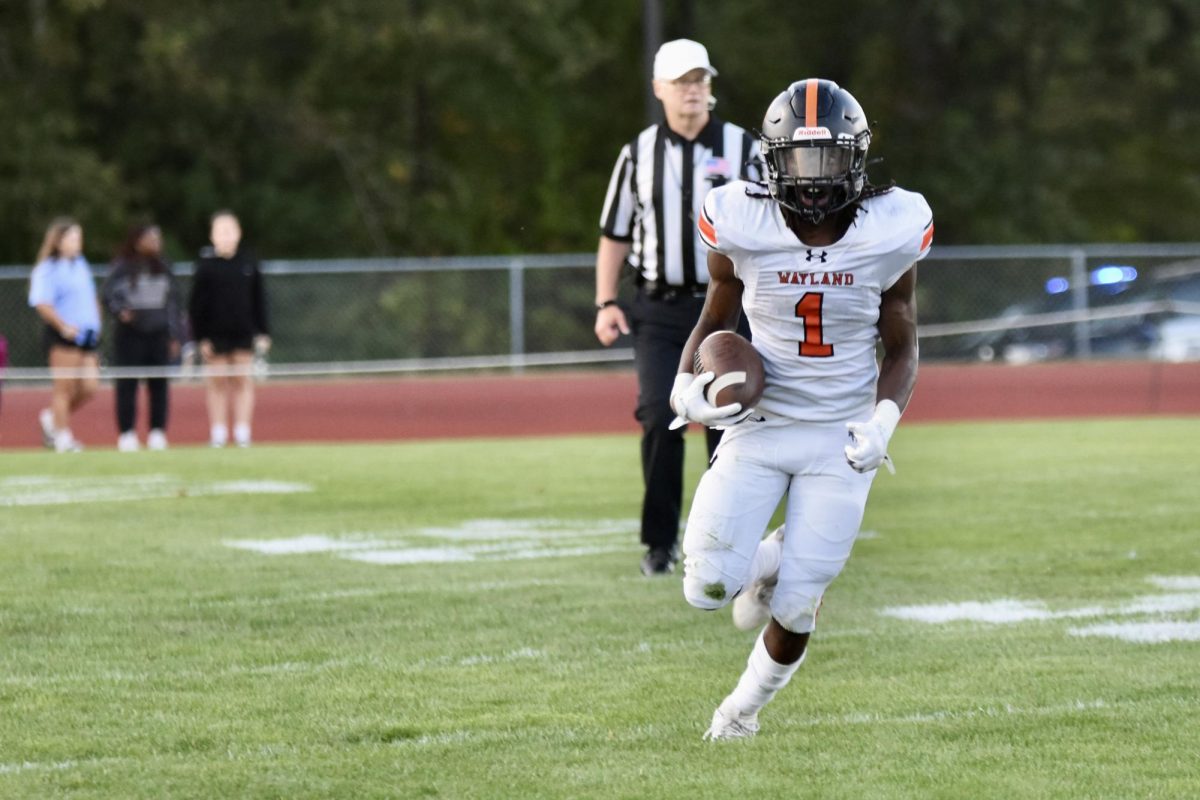“Fearless:” Taylor Swift’s decision to re-record her albums is groundbreaking
Credit: Theo Ghosh
WSPN’s Delia Caulfield discusses Taylor Swift’s decision to re-record her original six albums and how artists taking ownership of their unfairly stolen work is justified.
December 17, 2021
In 2019, Taylor Swift shocked the world when she announced her plan to re-record her first six studio albums. In 2018, Swift decided to part ways with her longtime record label, Big Machine Records, who owned the original recordings of Swift’s first six studio albums. This decision came as a result of Big Machine’s non-consensual sale of her work, and Swift made it clear that she was willing to do whatever it took to own her work in its entirety.
When Swift’s deal was up in 2018, she switched her label to Universal’s Republic Records which allowed her the freedom to own the masters to her future albums. After opting for this switch in her representation, Swift made it abundantly clear that things were going to change.
In the music industry, artists’ rights to their music are separated into two categories: the master license and the sync license. The master license is granted to whoever owns the original recording of the song. In Swift’s case, this was her old label, Big Machine Records. On the other hand, the sync license is granted to the composer of the song which entails that an artist has rights to a song’s lyrics as they wrote them themself.
“Artists should own their own work for so many reasons,” Swift wrote in an Instagram post. “But the most screamingly obvious one is that the artist is the only one who really knows that body of work.”
In 2019, Big Machine Records sold to Ithaca Holdings, an investment holding company focused on media and music. Ithaca Holdings is owned by big-time music manager Scooter Braun, who manages stars such as Ariana Grande and Justin Bieber. In selling to Braun and Ithaca Holdings, Big Machine Records was also selling Taylor Swift’s work. Braun then proceeded to sell Swift’s masters to another company, Shamrock Holdings. Swift’s first six records are rumored to be worth around $300 million dollars, so this deal was extremely profitable. However, the fact that Braun and Big Machine sold Swift’s albums without her consent is absurd as Swift claimed she tried to buy back her albums and was denied.
In my mind, the biggest issue here is treating Swift’s blood, sweat and tears as simply a business transaction and nothing else. Yes, Swift’s work is profitable, and it could be considered a smart business move to sell her albums as they are constantly bringing in revenue from her devout fans. However, keep in mind that it’s her work that she spent hours upon hours writing, not her old label’s work. Why shouldn’t she be allowed to buy the masters of her music? A deal’s a deal, and I find it tough to understand how the individuals who are supposed to help an artist flourish are the ones that are ultimately knocking them down.
Many artists have recognized that songs shouldn’t be confined to a single streaming service, and instead they should be popularized on other forms of media as well. In order to permit others to use their music in projects such as films or commercials, both the sync and master license needs to be obtained. Since Swift has written every one of her songs, she has the right to deny the sync license; therefore, it makes it impossible for filmmakers to use her songs as both licenses are legally required.
Swift has made it clear that she doesn’t intend to permit anyone to use her recordings that she doesn’t own the masters to. However, she has permitted the use of her re-recorded songs to be used in projects such as a dating app advertisement, which used the song, “Love Story (Taylor’s Version),” and in the movie trailer for “Spirit Untamed,” which used her re-recording of “Wildest Dreams.”
Some may ask, ‘why go through the trouble of re-recording six old albums?’ Revisiting old work may seem like a step backward. However, Swift isn’t any ordinary artist. In 2020, Swift released her two indie-pop albums, “Folklore” and “Evermore,” in only five months. This is unbelievable considering it takes a considerable amount of time to put out a single album. In addition, these two albums are unbelievably popular, with Swift’s eighth studio album, “Folklore,” winning album of the year at the 2021 Grammy Awards, making Swift the only female artist to win Album of the Year four times. Additionally, “Folklore’s” sister album, “Evermore,” has recently been nominated for Album of The Year at the upcoming 2022 Grammys, which will take place this Jan.
We know that Swift isn’t afraid to step out of her comfort zone as she has dabbled in a variety of musical genres ranging from country music to pop to Indie pop. Additionally, Swift has proven herself as more than dedicated to her craft and her writing, as she has written or co-written every song on all nine of her studio albums.
Swift’s writing is eloquent, and through each album or “era,” there is a new tone that sets it apart from the rest. That’s why her re-recordings are so appealing to fans. Even though some of her albums are over a decade old, the songs are timeless and are admired even years after their initial release.
In addition to being able to live through each “era” for a second time in their lives, fans are getting new material as well. In addition to the original songs on each album, Swift has been releasing songs that are “From the Vault” which are songs that were intended to be on one of her original albums but ultimately weren’t put on its final track list. These songs have quickly become fan-favorites, such as the song “Mr. Perfectly Fine,” off of “Fearless (Taylor’s Version)” and “All Too Well (10 Minute Version),” off of “Red (Taylor’s Version)” which has already hit number one on the charts.
With time comes growth, and this is vastly apparent in Swift’s re-recordings. When listening to the famous track “All Too Well” off of Swift’s “Red (Taylor’s Version),” there is a new maturity in Swift’s voice in comparison to her original version. The vocals are crisper, and it’s apparent that she has grown immensely as an artist in the nine years since Red’s original release.
It comes down to this: if an artist wants to own their work, they should be allowed to. To me, Swift’s plan to regain what is rightfully hers is more than justified, and it is a move that I admire. I hope Swift’s actions will inspire other artists to stand up for what’s rightfully theirs.
We can help. We can stream Taylor’s Version.















![This year, the Wayland team is made out of a JV team and a varsity team. There is a wide range of grades from eighth grade to twelfth grade that make up the teams. " [What] I will miss most [about the seniors] is their willingness to be involved," sophomore Mackenzie Grogan said. "Whether it was with school drama or referee frustration, they were really good at listening and giving good advice."](https://waylandstudentpress.com/wp-content/uploads/2025/10/8F0FD331-F005-4C3F-9F77-402D1C1953D6_1_201_a-1200x800.jpg)











